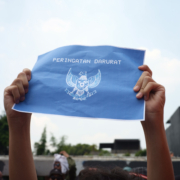
Grace Natalie, the first leader of the Indonesian Solidarity Party (PSI). Photo by Muhammad Adimaja for Antara.
Progressive politics in Indonesia has historically enjoyed only a narrow support base. Nevertheless, there have been several attempts to mobilise the support of progressives for political purposes.
In this week’s Talking Indonesia podcast, Dr Dave McRae chats with Dr Amalinda Savirani about one such example, the emergence of the Indonesian Solidarity Party (PSI) to contest the 2019 elections. As Dr Savirani and her co-authors highlight in their article, “Floating Liberals: Female Politicians, Progressive Politics, and PSI in the 2019 Indonesian Elections”, PSI stood out as having a female face. This was seen in the prominence of women among party leaders, the recruitment of women as almost half its candidates, and its willingness to tackle controversial issues relating to gender equality in Indonesia. The party secured a number of seats in regional legislatures (DPRD). At the national level, however, where parties must obtain 4% of the vote to occupy any seats in the House of Representatives (DPR), PSI fell well short, with only 1.89% of the vote.
What does the experience of PSI in 2019 reveal about the support base for progressive politics in Indonesia, and prospects for advancing progressive causes in Indonesia via elections? At a more basic level, what does it mean to be “progressive” in an Indonesian context?
Dr Amalinda Savirani is the coordinator of the PhD program in the Faculty of Political and Social Sciences at Universitas Gadjah Mada.
In 2022, the Talking Indonesia podcast is co-hosted by Dr Dave McRae from the University of Melbourne’s Asia Institute, Dr Jemma Purdey from Monash University, Dr Jacqui Baker from Murdoch University, and Tito Ambyo from RMIT.
Look out for a new Talking Indonesia podcast every fortnight. Catch up on previous episodes here, subscribe via Apple Podcasts or listen via your favourite podcasting app.











